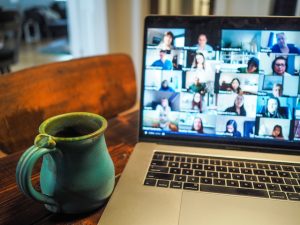Overwhelm 2021
The past year has been one that none of us could have imagined. The global pandemic bought fear and uncertainty into our lives and, optimistically, some of us hoped that entering a brand new year would magically restore normality.
While Australasia remains largely sheltered far from the horrific death toll and extended lockdown in other countries, it may seem a little churlish to mention Zoom fatigue, overwhelm and stress. But these are persistent themes I’m seeing in the clinic, which have continued into 2021.
The 2020 Marathon
End-of-year burn out is part of modern life.. We often create an artificial deadline to get things accomplished before the Christmas break. With so much put on hold due to lockdown and the extra burdens placed on businesses and carers, a lot of clients remarked they felt even more tired than usual as 2020 came to an end.
Usually all this is forgotten after a summer holiday. But the coronavirus had other things in mind for some Australians – with local lockdowns, border closures, cancellations and further disappointments. For many, this extra dollop of stress was the final straw.
Zoom fatigue
I love how technology has overcome geographical barriers and increased opportunities to communicate. It’s platforms like Zoom that allowed me to move interstate and continue working with my Melbourne clients and those even further afield.
But when ALL your work, care and socialising is via a screen, it can mess with your brain.
Zoom fatigue is real. It’s defined as the tiredness and burnout associated with overuse of video conferencing. There are some interesting theories about how this differs from fatigue caused by a long day with colleagues in an office.
The cause of Zoom fatigue is multifactorial. From the impact of the microsecond delay between seeing someone talk on the screen and hearing it, to being more sedentary as we sits through back to back meetings and other online tasks. As the novelty of working via Zoom wore off we’ve begun to multitask during sessions, further taxing our brain.
As well as the physiological impacts, some complex neuropsychological factors add to the mix, largely due to our addiction to feel good hormones like dopamine and oxytocin. It appears working entirely online releases fewer of these ‘rewards’, which sometimes subconsciously drives us harder to seek them. No wonder we’re feeling so tired.

See Zoom tips for a better set up than this!
[Photo by Chris Montgomery on Unsplash]
Overwhelmed
“A mixture of depression and stress. You feel like you want to cry because you have so much that is on your mind.”
Can you relate to the Urban Dictionary definition of overwhelm? Add months of uncertainty and disappointment, let alone pivoting so much that your head spins, it’s no wonder little things might start to feel too much to deal with.
Despite having good reasons to be hopeful, with the return to ‘donut’ days, children back in school and the vaccine rollout, I’m seeing a lot of overwhelm in my practice at the moment. And that’s not counting clients in the UK, who are living through endless lockdown groundhog days and winter bleakness.
Hacks to reduce overwhelm while working from home
Wherever you work from, these tips can help reduce fatigue.
- Move more. If you have any control over timing of meetings, make sure there’s a break between them. Move your body, stretch and even get a few moment of sunshine or outdoor air.
- Don’t eat lunch at your desk.
- When possible get a dose of nature. Trees, sea, even walking barefoot on grass helps to calm us.
- Ergonomics really matter and if your work station is incorrectly set up it can add to fatigue. It’s a year on from when many of us started working from home and yet I still have Zoom meetings with people whose screens aren’t directly in front of them, which can lead to chronic neck and other problems.
- Get to bed early enough to have eight hours sleep.
- If you’re feeling tired, rethink alcohol. If you are a regular drinker, try being alcohol-free during the week.
- If working in your living or sleeping space, pack it up or throw a cloth over your work set up when you finish for the day.
- Pre-pandemic strategies to reduce overwhelm.
Tips to reduce Zoom fatigue
When I transitioned to an online practice, it took me a couple of years to create the best set up. Here’s some of the things that help me through a day of Zoom calls.
- Noise cancelling headphones (with a microphone) can be a life saver. It’s easier to hear with earbuds or headphones but if you’re in a noisy environment (my house is under the flight path!), the noise cancelling function can really reduce fatigue.
- How is your lighting? If not for you, having front rather than back lighting will reduce fatigue for those you teleconference with. Light from behind puts your face in shadow.
- Likewise, make sure your camera is at eye level. This also makes your expressions easier to read, reducing the fatigue of your viewer
It’s more tiring to talk to someone when you can’t easily read their facial expressions. - Don’t forget those breaks throughout the day!
Pro tip: I’ve had a run of all day virtual conferences. As an attendee, with no need to have camera on, I’ve been fortunate to be working alone from home so can stream my computer through a smart TV. The sound is better and there’s more space to change position and even utilise the yoga mat for stretches.

[photo Niklas Hamann on Unsplash]
Still fatigued?
While 2020/21 fatigue is a definite ‘thing’, some gentle naturopathic support can improve your resilience and help you through it.
Of course, there are many other or confounding reasons that can cause fatigue, so consider booking in for a check up.
Postscript
Overwhelm is complex
I compiled this article in early March 2021, while an entirely different storm was brewing. You’d need to be living under a rock in Australia to have missed the repeated reports of alleged sexual assaults. Many of us are feeling saddened, overwhelmed and even physically ill. If you are a survivor of sexual abuse and are feeling triggered, 1800RESPECT offers free, 24 hours a day support.
Similar Posts:
Social Share
One Comment
Leave a Reply
You must be logged in to post a comment.






Pingback: Gill Stannard » March update: overwhelm (and rage!)